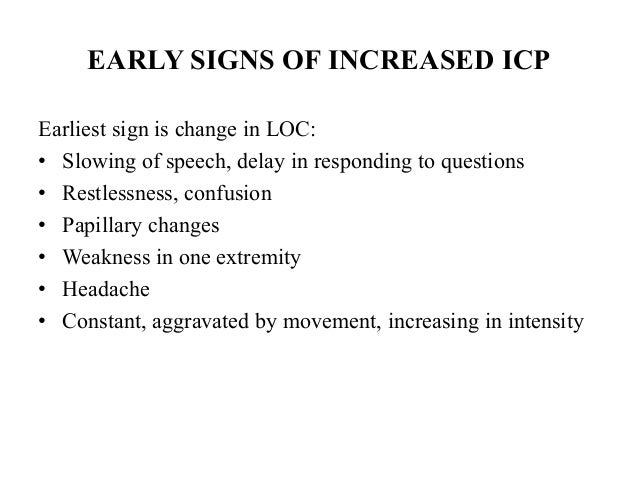
Early Signs Of Increased Intracranial Pressure. Increased intracranial pressure is a medical term that refers to growing pressure inside a person s skull. Functional signs of the forming papillary oedema and central eye movement disorders may be predictors of increasing intracranial pressure. Signs of increased intracranial pressure like headache vomiting seizure are common but icp can be life threatening. The symptoms and signs of raised intracranial pressure are often non specific and insidious in onset.

There can be a simultaneous decrease in the muscle tone of the upper and lower extremities weakness of the facial musculature. Consideration must be given to determine if the symptoms a patient is displaying can be attributed to another condition such as a stroke or if they are a consequence of increased icp. The signs of increased icp include. The symptoms and signs of raised intracranial pressure are often non specific and insidious in onset. Confusion about time and then location and people as the pressure worsens. This pressure can affect the brain if doctors do not treat it.
One of the earliest signs of a sharp increase in cranial pressure is a symptom of the enlargement of one or two pupils and the absence of their response to a light ray.
This pressure can affect the brain if doctors do not treat it. Late signs of increased intracranial pressure include an increased systolic blood pressure and decreasing diastolic blood pressure widening pulse pressure bradycardia and decreased respirations. Functional signs of the forming papillary oedema and central eye movement disorders may be predictors of increasing intracranial pressure. Increased intracranial pressure is a medical term that refers to growing pressure inside a person s skull. Visual acuity is usually preserved. One of the earliest signs of a sharp increase in cranial pressure is a symptom of the enlargement of one or two pupils and the absence of their response to a light ray.